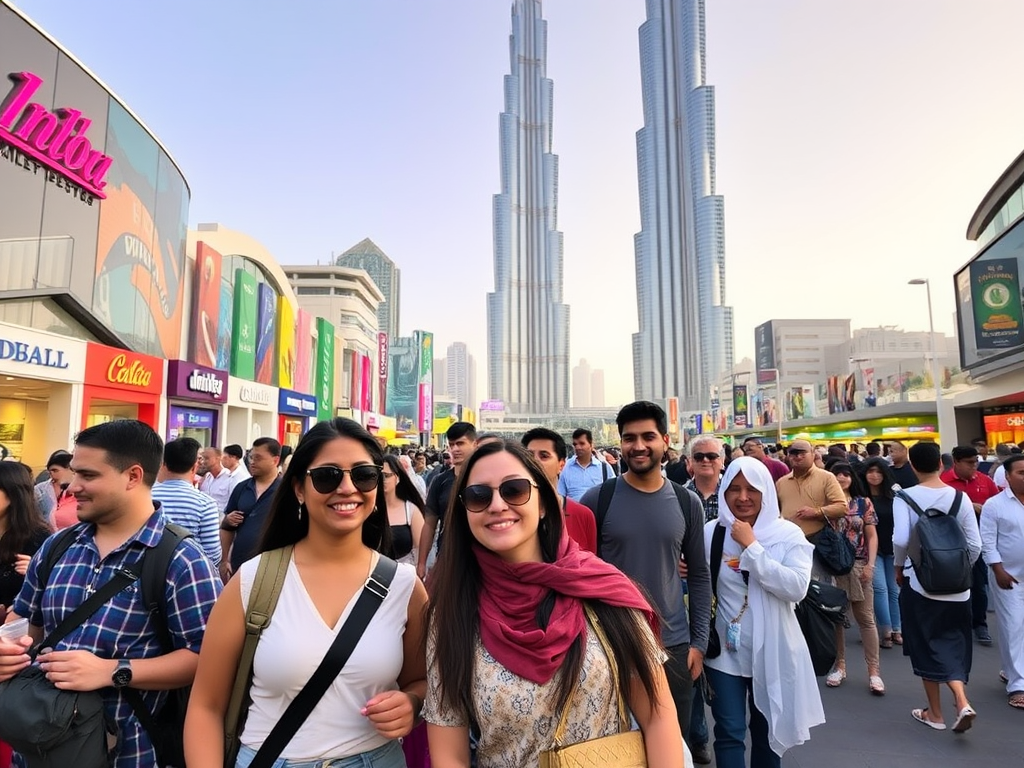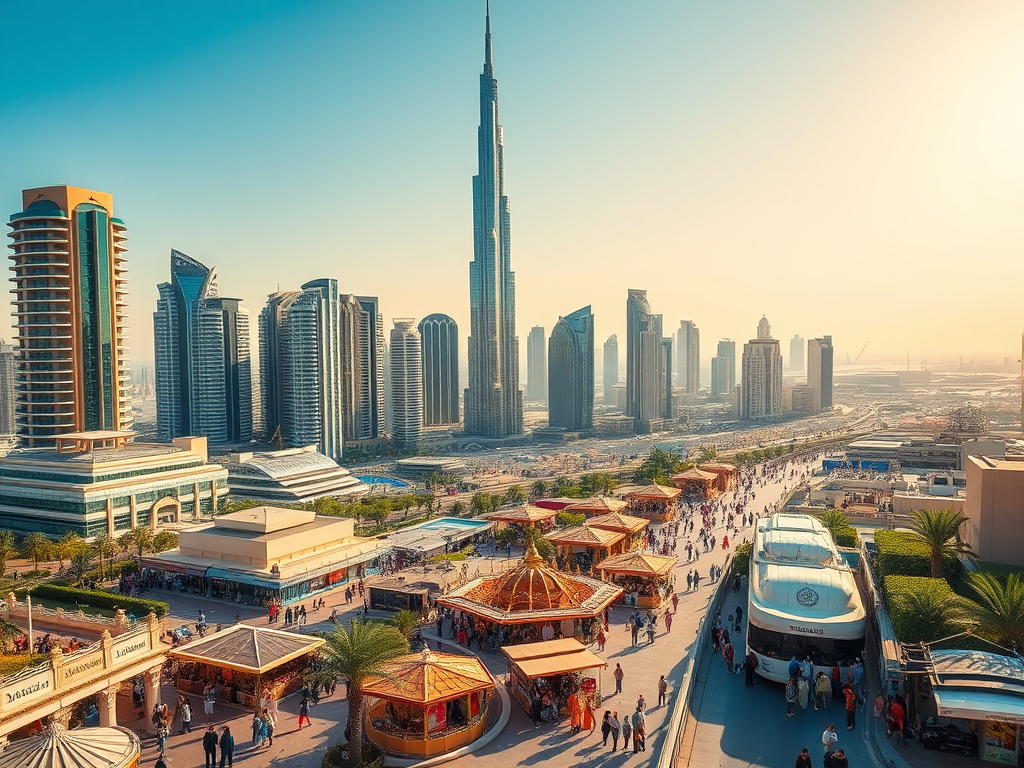Understanding the Impact of Tourism on Dubai’s Real Estate Market
Dubai stands as a symbol of contemporary luxury and ambition, making it a prime destination that attracts millions of tourists each year. As a city designed for exploration and indulgence, its stunning architecture, vibrant culture, and luxurious lifestyle draw in visitors from around the globe. This influx of tourists translates into a booming real estate market that is intricately intertwined with the tourism sector. Investors and homeowners alike are keenly aware of how tourism impacts property demand, pricing, and overall market dynamics. The essence of this interplay defines not only the real estate landscape but also the economic fabric of Dubai. Understanding how these two elements interact is essential for anyone considering investment opportunities or simply seeking to understand the market.
Introduction to Dubai’s Tourism Sector

Tourism in Dubai has experienced exponential growth over the past two decades, propelled by strategic initiatives and extensive infrastructure development. Major attractions like the Burj Khalifa and the Palm Jumeirah have positioned Dubai as a global leader in tourism. As a result, statistics show that visitor numbers reached a staggering 16.73 million in 2019, with aspirations to reach 25 million by 2025. This remarkable growth has led to a flourishing real estate market, with various properties catering to different demographics. From luxury hotels to serviced apartments, the market is diverse and ever-evolving. It’s crucial to recognize that the health of the tourism sector directly influences the vibrancy of the real estate domain.
Correlation Between Tourism and Real Estate

The connection between tourism levels and real estate demand is fundamental in understanding Dubai’s property market. When more tourists visit the city, there is an increased demand for accommodations, whether for short-term rentals or longer stays. This heightened demand can lead to upward pressure on rental prices and spur new developments in the real estate sector. For investors, recognizing these patterns can yield significant returns. Furthermore, tourism-related businesses, such as hotels and vacation rentals, contribute extensively to the local economy, enhancing job opportunities and overall wealth. As we dig deeper, we can see how this demand translates into tangible opportunities for growth.
Influence of Visitor Numbers on Housing Demand
As tourism numbers soar, so does the demand for various types of housing. High visitor numbers lead to an increasingly competitive rental market. Tourists often seek out short-term rentals, prompting homeowners and investors to capitalize on this trend. In response to this demand, many property owners shift their focus towards short-term rental options, such as Airbnb and vacation homes. The result is a dynamic interplay where the real estate market continuously adapts to meet the preferences of visitors. This, in turn, enhances the overall attractiveness of Dubai as a destination for both tourists and investors.
Investment Opportunities Stemming from Tourism
The surge in tourism not only influences existing property demand but also creates enticing investment opportunities in Dubai’s real estate market. Various categories of properties are particularly well-suited for investment as they cater to the taste of visitors. Below are some promising investment opportunities influenced by tourism:
- Luxury hotels and resorts
- Serviced apartments targeting business travelers
- Vacation homes in popular tourist areas
- Commercial properties that support tourism activities
Investing in these types of properties can yield high returns, especially during peak tourist seasons. Moreover, the real estate market in Dubai is characterized by relatively low entry barriers, attracting numerous local and international investors.
The Role of Short-Term Rentals
The rise of short-term rental platforms has radically reshaped the real estate landscape in Dubai. Visitors increasingly prefer the flexibility and home-like comfort that short-term rentals provide over traditional hotels. This trend has stimulated a significant shift in property management, with many owners transitioning to short-term leasing models. However, investing in short-term rentals comes with its unique complexities, including regulatory compliance and management challenges.
Regulatory Framework for Short-Term Rentals
To ensure the sustained appeal of Dubai as a tourist destination, local authorities have developed regulations surrounding short-term rentals. These measures aim to balance the needs of tourists and residents while maintaining the integrity of the real estate market. Owners of short-term rentals are required to obtain permits and adhere to specific guidelines set forth by the Dubai Tourism and Commerce Marketing (DTCM). Understanding these regulations is crucial for both property owners and investors.
Economic Impact of Short-Term Rentals
Short-term rentals significantly contribute to the economy through various channels, including job creation and increased consumer spending. They offer an alternative to traditional accommodations, encouraging diverse tourist demographics to explore Dubai. The resulting circulatory flow of capital supports local businesses, from restaurants to tour operators. Below is a concise table that outlines various economic benefits associated with short-term rentals:
| Benefit | Description |
|---|---|
| Job Creation | Increased demand for cleaning, maintenance, and customer service roles. |
| Local Spending | Tourists contribute to local businesses, enhancing community economic growth. |
| Tax Revenue | Short-term rentals generate additional tax income for local government. |
As we analyze the contributions of short-term rentals, it becomes clear that they play a foundational role in shaping both the tourism and real estate sectors in Dubai.
Impact of Major Events and Attractions
Dubai routinely hosts high-profile global events, which serve as catalysts for tourism and, consequently, real estate growth. Events such as the Dubai Shopping Festival and international conventions attract millions of visitors, directly impacting rental demand and property values. Notably, attractions such as the Dubai Aquarium and Underwater Zoo also draw in significant foot traffic, which can enhance nearby property desirability. Each event creates distinct opportunities for real estate investment, leading to fluctuating market dynamics. Understanding these patterns can greatly benefit those looking to invest or enter the housing market.
Key Attractions Driving Real Estate Growth
Several key attractions in Dubai have a considerable impact on real estate trends. Here are a few noteworthy mentions:
- Burj Khalifa – The tallest building in the world attracts countless visitors annually.
- Dubai Mall – One of the largest shopping and entertainment destinations globally.
- Dubai Marina – A popular waterfront destination with a vibrant dining and leisure scene.
- Expo 2020 – An event that has reshaped infrastructure and increased tourism.
The intersection of tourism and real estate is often reflected in property prices near these attractions, showing that location remains a critical factor for potential investors.
Major Events and Their Real Estate Implications
Major events like the Dubai Shopping Festival not only celebrate culture but also significantly affect the rental market. During these times, landlords often increase their rates to meet heightened demand. Conversely, properties that can accommodate short-term stays may experience drastic price surges. Investors should strategize timeframes and pricing models to maximize their returns during major events. Special attention must be paid to the fluctuations in the rental market, especially during peak tourism months.
Challenges Facing the Market
Despite the invigorating prospects tourism presents for Dubai’s real estate market, several challenges loom on the horizon. Market saturation and overcapacity could pose risks for property investors. As more properties enter the short-term rental market, the potential for price competition increases, which could adversely impact rental rates. Investors must be cautious about entering into saturated areas, as the value of their investment could heavily depreciate.
Market Saturation and Overcapacity
With numerous properties available for short-term rentals, the competitive landscape becomes a double-edged sword. A saturated market means potential investors may face challenges in attracting tenants, leading to lower occupancy rates. This is particularly true in popular tourist districts, where too many properties compete for limited visitor attention. Careful market evaluation will help investors identify niches that are less crowded and have significant growth potential.
Economic Vulnerabilities Linked to Tourism Dependence
Another crucial concern is the market’s heavy reliance on tourism, which can lead to vulnerabilities during global crises. Events such as pandemics or economic downturns can drastically reduce tourist numbers, leading to a slump in property demand. Additionally, investors must consider the cyclical nature of tourism and its direct implications for real estate. It is vital to diversify investments and create contingency plans to navigate unforeseeable circumstances.
Conclusion
The relationship between tourism and Dubai’s real estate market is both potent and intricate, revealing numerous opportunities alongside significant challenges. As the city continues to evolve, so too does its appeal to tourists, resulting in dynamic market shifts. Investors must remain agile, adjusting to fluctuating demands while being vigilant of market saturation and economic vulnerabilities. The city’s ongoing development and global events will continue to shape the landscape, and understanding these factors is essential for future growth. Dubai’s real estate market presents a landscape ripe for investment but requires a nuanced understanding of tourism dynamics for success.
Frequently Asked Questions
- How does tourism affect property values in Dubai?
Tourism contributes to increased demand for properties, which can drive property values upward, especially in popular areas. - What types of real estate are most influenced by tourism?
Short-term rental properties and luxury developments typically see the most impact from tourism trends. - Are there regulations for short-term rentals in Dubai?
Yes, there are specific rules and permits required to operate short-term rentals in Dubai, aimed at ensuring compliance and quality. - What impact did Expo 2020 have on the real estate market?
Expo 2020 led to increased investment, population growth, and a surge in short-term rentals, all positively affecting the real estate sector. - Is the tourism-driven real estate market sustainable long-term?
While tourism boosts real estate, potential vulnerabilities exist, such as economic downturns and over-dependence on visitor numbers, which could affect long-term sustainability.



